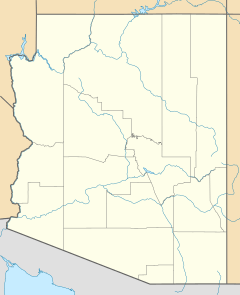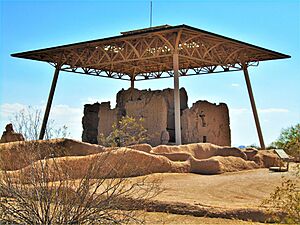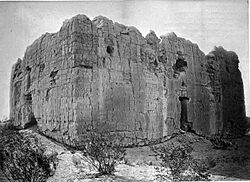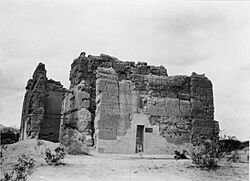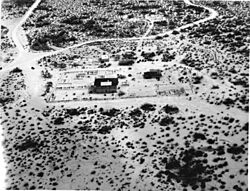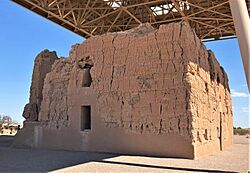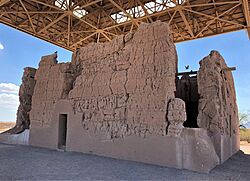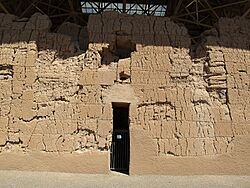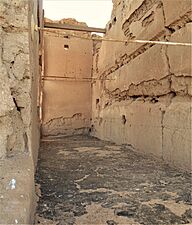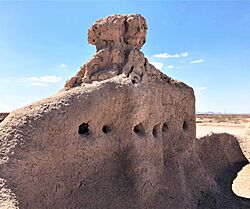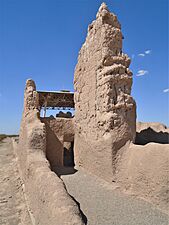Casa Grande Ruins National Monument facts for kids
Quick facts for kids Casa Grande Ruins National Monument |
|
|---|---|
|
IUCN Category III (Natural Monument)
|
|
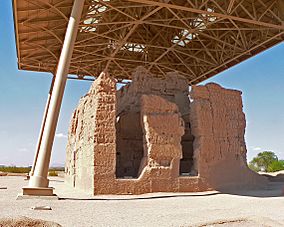
The southern facade of the "Big House"
|
|
| Location | Pinal County, Arizona, USA |
| Nearest city | Coolidge |
| Area | 472.5 acres (191.2 ha) |
| Created | August 3, 1918 |
| Visitors | 62,995 (in 2018) |
| Governing body | National Park Service |
| Website | Casa Grande Ruins National Monument |
| NRHP reference No. | 66000192 |
| Added to NRHP | October 15, 1966 |
The Casa Grande Ruins National Monument is a special place in Coolidge, Arizona. It protects ancient buildings made by the Hohokam people. These ruins are from a time called the Classic Period, between 1150 and 1450 CE.
The most famous building here is called the "Big House." It's a really old and important part of American history.
Contents
Exploring the Ancient Big House
This national monument has many old buildings, all surrounded by a wall. The ancient Hohokam people built these structures. They lived in the Gila Valley around the 1200s.
Archaeologists have found that these people were very skilled. They created large-scale irrigation systems to farm. They also had a big network for trading goods. Their culture lasted for over a thousand years, until about 1450 CE.
What "Casa Grande" Means
"Casa Grande" means "big house" in Spanish. In the O'odham language, it's called Siwañ Wa'a Ki:. These names refer to the largest building at the site. It was once a four-story structure.
The Big House might have been left empty by 1450. It is made from a natural material called caliche. This strong material helped it survive harsh weather for about 700 years.
How the Big House Was Built
The Big House has outer rooms surrounding an inner part. The outer rooms are three stories tall. The inner structure is four stories high. The builders used traditional adobe methods.
They made the walls by using damp adobe. The adobe was thicker at the bottom for extra strength. They would build a layer, let it dry, and then add more. You can still see horizontal lines where new layers were added.
The site also had a ball court, similar to one found at Pueblo Grande de Nevada.
First European Visitors
In November 1694, a European named Father Eusebio Kino saw the Hohokam complex. He was the first European to see it and named it Casa Grande.
Later, people passing by in the 1800s scratched their names into the walls. This kind of graffiti is now against the law. Today, a special modern roof covers the Big House. It was built in 1932 to protect the ancient structure.
Protecting the Ruins
In 1891, some repairs were made to the monument. Cosmos Mindeleff from the Bureau of American Ethnology oversaw this work.
On June 22, 1892, President Benjamin Harrison declared the area the Casa Grande Reservation. This made 480 acres around the ruins the first protected historical site in the United States.
Later, on August 3, 1918, President Woodrow Wilson changed its name. It became a U.S. National Monument. Like other historical places managed by the National Park Service, Casa Grande was added to the National Register of Historic Places in 1966.
Buildings from the 1930s
Between 1937 and 1940, a group called the Civilian Conservation Corps (CCC) built new adobe buildings. These were used for housing and offices at the monument.
These CCC buildings were made using traditional adobe methods. They are still used today and are also on the National Register of Historic Places. Thanks to careful work, the Casa Grande Ruins look much the same as they did in the 1940s.
The Olmsted Shelter
In 1932, a large roof-like structure was built over the ruins. This shelter protects the buildings from weather damage. It was designed by an architect named Frederick Law Olmsted Jr..
Sometimes, great horned owls make their nests in the rafters of this shelter. The current shelter replaced an older wooden one from 1903.
Because the Big House is very old and fragile, visitors cannot go inside. You can only observe it from the outside to help keep it safe.
Gallery
See also
 In Spanish: Monumento nacional Ruinas de Casa Grande para niños
In Spanish: Monumento nacional Ruinas de Casa Grande para niños
- Hohokam Pima National Monument
- List of national monuments of the United States
- List of the oldest buildings in Arizona
- Mesa Grande
- Oasisamerica cultures
- Pueblo Grande Ruin and Irrigation Sites


